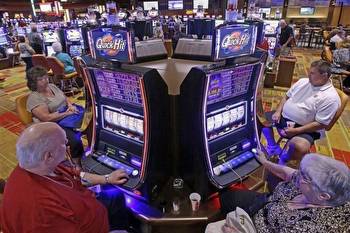A Record Jackpot: America's Casinos Hit $66.5 Billion in 2023 Amidst Inflation Woes

Imagine walking into the vibrant, cacophonous world of a casino. The sound of slot machines ringing in harmony with cheers from the craps table fills the air. This scene, replicated across the United States, has not only survived an inflation-hit economy but thrived, with American casinos raking in a staggering $66.5 billion in 2023. This figure isn't just another statistic; it marks the commercial casino industry's most lucrative year, buoyed by an insatiable demand for gaming despite economic headwinds.
The Drivers of Growth: Sports Betting and Online Gambling
The surge in casino revenues can be attributed to several key factors, most notably the expansion of sports betting and online gambling. The introduction of sports betting in five new markets, including Kentucky and Massachusetts, propelled revenues to reach $10.92 billion, a 44.5% jump from the previous year. Meanwhile, internet gambling, with Michigan leading the charge, grew by 22.9% to $6.17 billion. This diversification into digital realms has not only broadened the industry's customer base but has also made gambling more accessible, contributing to its record-breaking performance.
Traditional Gaming Holds Strong
Despite the digital revolution sweeping through the gambling world, traditional gaming avenues have held their ground. Slot machines and table games continued to be the mainstay of casinos, generating $35.51 billion and $10.31 billion respectively. This enduring popularity underscores a simple truth: while the platforms may evolve, the allure of gambling remains timeless. The tactile experience of pulling a slot machine lever or the suspense of a blackjack game cannot be entirely replicated online, preserving the relevance of brick-and-mortar casinos.
The Economic Impact and Future Challenges
While the booming casino revenues paint a picture of prosperity, they also underscore the industry's significant economic footprint. Gaming taxes contributed $14.42 billion to state and local governments, marking a 9.7% increase from the previous year. This financial injection supports various public services, highlighting the sector's role as a key economic driver. However, the industry's rapid growth and the increasing shift towards online gambling present new challenges, from regulatory hurdles to concerns about gambling addiction. Balancing economic benefits with social responsibility will be crucial as the industry navigates its future.
As the dust settles on a record-breaking year, the American casino industry stands at a crossroads. The influx of digital gambling options offers unprecedented growth opportunities but also tests the sector's adaptability and ethical compass. What remains clear, however, is the unwavering American appetite for gambling, a testament to the industry's resilience and its ability to reinvent itself in the face of changing times.
































